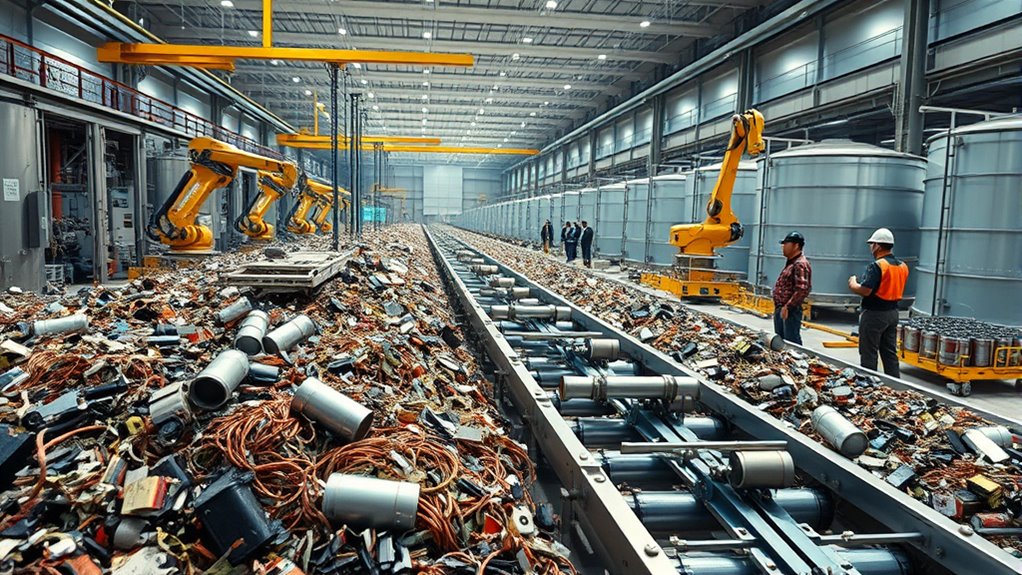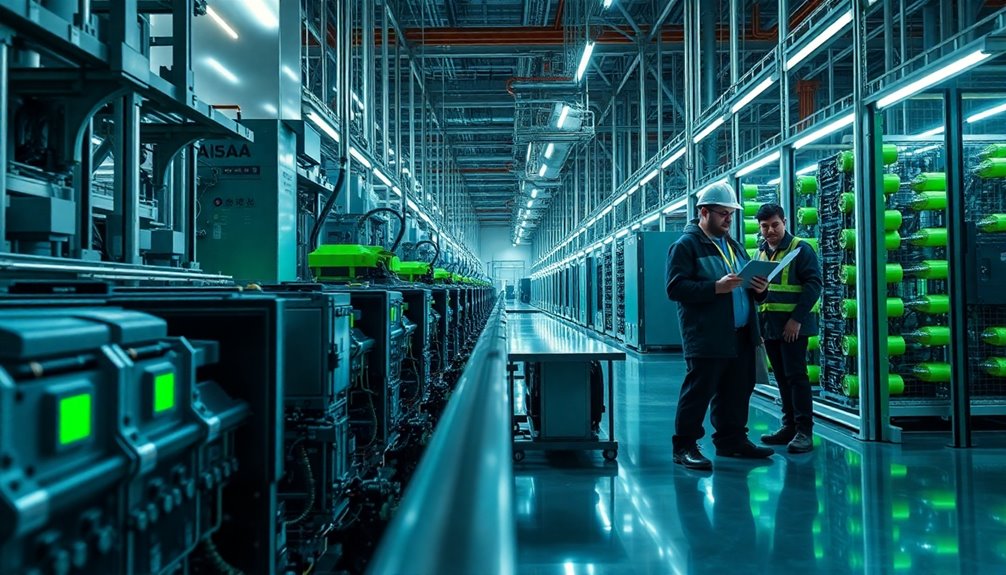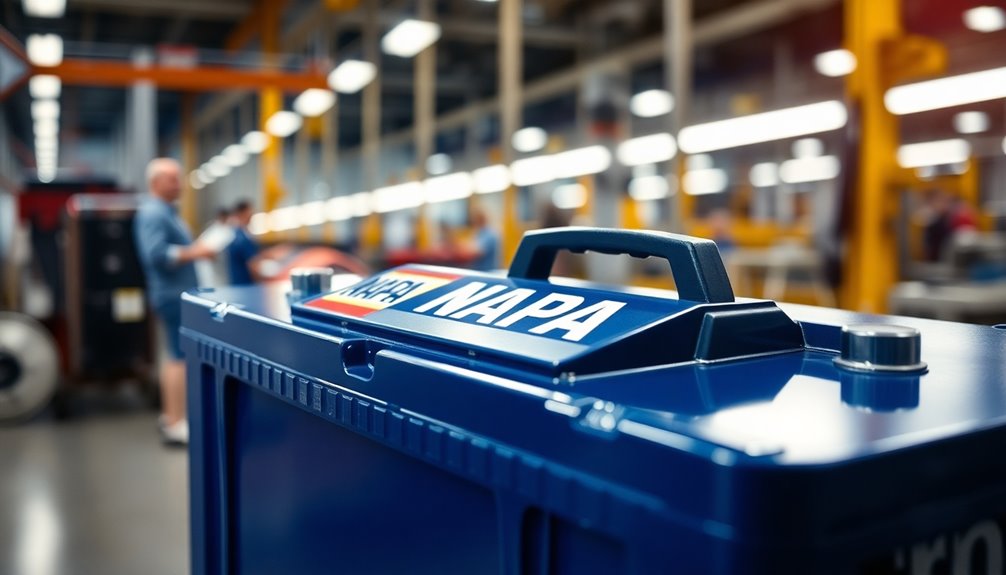Battery recycling is becoming the new oil boom for investors because of its essential role in supporting the booming electric vehicle market and renewable energy storage. As demand for critical materials rises and supply chains face geopolitical challenges, recycling offers a sustainable way to recover rare earths and reduce reliance on environmentally damaging mining. The industry is rapidly growing, backed by supportive policies and technological advances. Keep exploring how this evolving sector can open new opportunities for your investment portfolio.
Key Takeaways
- Growing EV market drives high demand for battery materials, creating lucrative recycling opportunities.
- Recycling recovers rare earths and critical metals, reducing reliance on geopolitically sensitive mining.
- Industry advancements and supportive policies boost profitability and sustainability of battery recycling.
- Recycling mitigates raw material supply risks, offering a strategic hedge similar to oil investments.
- Increasing consumer and governmental focus on sustainability enhances long-term growth prospects for recycling firms.

As the demand for electric vehicles and renewable energy storage soars, battery recycling has emerged as a compelling investment opportunity. You’re likely aware that electric vehicles are transforming transportation, but what often goes unnoticed is the critical role of battery recycling in supporting this shift. When you invest in battery recycling, you’re not just participating in a growing industry—you’re helping to secure a sustainable future. One of the key reasons this field is so promising is the increasing scarcity of rare earths. These elements are essential components in many EV batteries, and their supply chain faces significant geopolitical and environmental challenges. As demand for electric vehicles continues to rise, so does the pressure on the availability of rare earths, making recycling an attractive solution to recover these valuable materials efficiently.
You should consider that electric vehicle batteries contain a wealth of rare earth elements, such as neodymium and dysprosium, which are crucial for producing powerful magnets used in EV motors. Recycling these batteries allows you to recover these rare earths, reducing dependence on mined materials that often come from unstable regions or environmentally damaging extraction processes. This makes battery recycling not only a profitable venture but also a strategic one, helping to stabilize supply chains and curb geopolitical risks. Additionally, as battery technology evolves, the amount of recyclable material increases, providing more raw material that can be reused in new batteries, creating a circular economy that benefits your investments and the environment alike. Furthermore, advancements in projector technology demonstrate how continuous innovation can enhance the efficiency and sustainability of recycling processes, making this industry even more vital in the transition to a greener future.
Your involvement in battery recycling positions you at the forefront of a technological and environmental revolution. Governments worldwide are recognizing the importance of sustainable practices and are implementing policies that favor recycling initiatives. These policies can boost your profitability through incentives, grants, or favorable regulations. Furthermore, as consumers become more environmentally conscious, the demand for responsibly sourced materials grows, giving your investments added value. Recycling electric vehicle batteries is also a way to extend the lifecycle of these expensive components, making your investments more sustainable and less dependent on volatile raw material markets.
Frequently Asked Questions
What Are the Main Environmental Benefits of Battery Recycling?
You’ll see that battery recycling offers significant environmental benefits by reducing harmful waste and lowering the environmental impact of mining new materials. It promotes resource conservation by reclaiming valuable metals, which decreases the need for extracting raw materials. This process helps cut down on pollution, conserves natural resources, and minimizes the carbon footprint associated with battery production and disposal, making it an essential step toward a more sustainable future.
How Does Government Policy Influence Battery Recycling Investments?
Government policies play a pivotal role in shaping your battery recycling investments. When policymakers introduce incentives and establish clear regulatory frameworks, they encourage growth in the sector. These measures lower costs, attract new players, and promote innovation. Your confidence grows as the government demonstrates commitment to sustainability, making battery recycling more profitable and sustainable. Ultimately, supportive policies help you capitalize on this emerging market while contributing to environmental preservation.
What Are the Risks Associated With Investing in Battery Recycling Companies?
You should consider financial risks and market volatility when investing in battery recycling companies. These firms face uncertainties like fluctuating raw material prices, changing regulations, and technological advancements. Market shifts can impact profitability, and investments might not pay off if the industry doesn’t grow as expected. Stay informed and diversify your portfolio to manage these risks effectively, ensuring you’re prepared for potential ups and downs.
How Scalable Is Current Battery Recycling Technology Globally?
When it comes to scalability, you’ll find that current battery recycling tech is making strides, but it’s still a work in progress. With global capacity expanding thanks to technological advancements, the industry is gradually ramping up. However, challenges like infrastructure gaps and differing regulations mean it’s not a cakewalk. While growth potential is promising, you should watch how quickly innovations and policies align worldwide before jumping in headfirst.
What Future Innovations Could Impact the Battery Recycling Market?
You should watch how future innovations could reshape the battery recycling market. Advances in battery chemistry, like solid-state or lithium-silicon, might improve recycling efficiency by making processes more straightforward and less costly. New recycling processes could also develop, reducing environmental impact and increasing recovery rates. These innovations will likely make recycling more scalable and sustainable, opening new opportunities for investors looking to capitalize on this growing industry.
Conclusion
As you explore the world of battery recycling, you’re opening doors to a promising horizon. While it may not be the traditional gold rush, this shift hints at a future where resources are valued anew. By embracing this change, you position yourself at the forefront of a quietly evolving landscape—one that rewards patience and foresight. Sometimes, the most subtle currents carry the greatest potential; it’s all about recognizing the right moment to sail with the tide.










